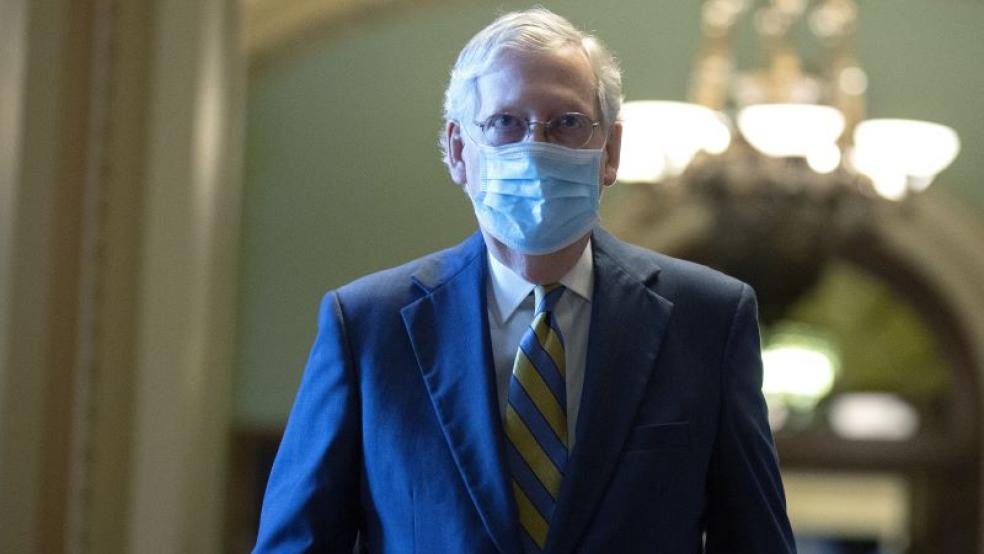After struggling for days to coalesce around a plan, Senate Republicans on Monday released a $1 trillion coronavirus relief package, dubbed the HEALS Act, an acronym for Health, Economic Assistance, Liability Protection and Schools.
The proposal — which arrives as a host of emergency programs signed into law last spring, including enhanced unemployment insurance benefits, are expiring — will serve as a starting point for what are expected to be difficult negotiations with Democrats, who in May passed a $3 trillion relief package in the House.
The rollout comes after Treasury Secretary Steven Mnuchin and White House Chief of Staff Mark Meadows reportedly spent the weekend on Capitol Hill negotiating the text of the plan with Senate aides. At the same time, the White House, in an acknowledgment that Congress may still be weeks away from a vote on a coronavirus package, continued over the weekend to suggest the idea of a narrower bill that would include only unemployment insurance, school funding and a liability shield.
“To give a sense of the optimism on the GOP side right now, White House officials spent much of the weekend floating a less ambitious Plan B option -- before their Plan A even sees the light of day,” CNN’s Phil Mattingly says. “Republicans are, just on Monday, releasing their opening bid, which President Donald Trump's administration is already moving away from in order to pitch a scaled-back proposal Democrats have already rejected. This is, to say the least, not an ideal way to kick off long-delayed bipartisan talks.”
Some key provisions in the GOP proposal:
Unemployment benefits: Republicans propose to cut the $600 per week federal benefit provided by the CARES Act and replace it with a system that provides 70% of wages, with a cap. States would be given two months to set up systems capable of making that calculation, which could be a serious challenge for technologically deficient employment offices. During the transition period, unemployed workers would receive a flat $200 per week in extra relief, which, when combined with state-level insurance payments, would approximate the 70% wage replacement target.
The National Association of State Workforce Agencies has expressed concerns about the GOP’s proposed unemployment system, saying it would take anywhere from eight to 20 weeks to implement. Democrats, and many economists, warn that cutting the $600 payments will hurt workers and the broader economy. Democrats have instead proposed extending the $600 payments through January or tying the level of emergency payments to state unemployment levels.
Stimulus payments: The GOP defends its push to cut emergency unemployment benefits in part by providing for another round of $1,200 stimulus checks for American adults earning less than $75,000 per year, following the model of the first round provided by the CARES Act, though with a new allowance for adult dependents.
School aid: The package calls for $105 billion for schools, with $70 billion designated for K-12, $30 billion for higher education, and $5 billion for governors to use as they see fit.
Coronavirus testing: This was an area of dispute between the White House and Senate lawmakers. In the end, the package would provide another $16 billion for grants to states to cover the cost of testing, in addition to the $9 billion in uncommitted funds left over from the CARES Act, for a total of $25 billion.
Liability shields: Businesses, schools, health care providers and nonprofits that are reopening would receive legal protection from lawsuits related to coronavirus illnesses and deaths.
Small business: The Paycheck Protection Program would be extended with more funding and change its rules to allow hard-hit small businesses take out a second loan.
Evictions: The bill would extend the moratorium on evictions established by the CARES Act.
Vaccines: Republicans would add $26 billion for research and distribution of coronavirus vaccines.
Tax breaks: Republicans want to provide a higher level write-offs for business meals; an enhanced employee retention tax credit; and deductions for employer purchases of coronavirus-related supplies such as personal protective equipment.
FBI headquarters: The bill includes nearly $1.8 billion for a new FBI headquarters building in Washington, D.C., across from the street from the Trump International Hotel. Sen. Richard Shelby (R-AL) said the Trump administration requested this provision. Asked what it had to do with coronavirus relief, Shelby said, “That's a good question.”
Budget
Republicans Roll Out $1 Trillion Coronavirus Relief Plan





